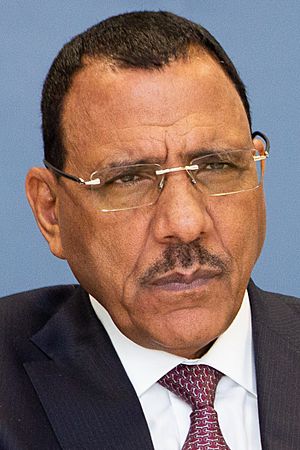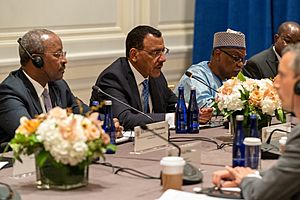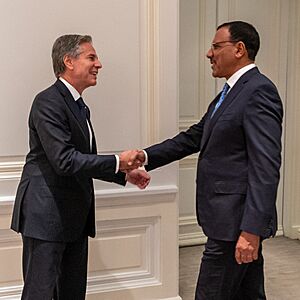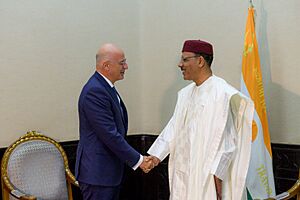Mohamed Bazoum facts for kids
Quick facts for kids
Mohamed Bazoum
|
|
|---|---|
|
محمد بازوم
|
|

Bazoum in 2023
|
|
| 10th President of Niger | |
| In office 2 April 2021 – 26 July 2023 |
|
| Prime Minister | Ouhoumoudou Mahamadou |
| Preceded by | Mahamadou Issoufou |
| Succeeded by | Abdourahamane Tchiani |
| President of the Nigerien Party for Democracy and Socialism | |
| In office March 2011 – 20 December 2022 |
|
| Preceded by | Mahamadou Issoufou |
| Succeeded by | Foumakoye Gado |
| Minister of the Interior | |
| In office 13 April 2016 – 1 April 2021 |
|
| President | Mahamadou Issoufou |
| Prime Minister | Brigi Rafini |
| Preceded by | Hassoumi Massaoudou |
| Succeeded by | Alkache Alhada |
| Minister of Foreign Affairs | |
| In office 21 April 2011 – 26 February 2016 |
|
| President | Mahamadou Issoufou |
| Prime Minister | Brigi Rafini |
| Preceded by | Aminatou Maïga Touré |
| Succeeded by | Aïchatou Boulama Kané |
| In office 25 February 1995 – 5 May 1996 |
|
| President | Mahamane Ousmane |
| Prime Minister | Amadou Cissé |
| Preceded by | Abdourahmane Hama |
| Succeeded by | André Salifou |
| Member of the National Assembly | |
| In office February 2005 – 2021 |
|
| Constituency | unknown |
| In office 11 April 1993 – January 1995 |
|
| Constituency | Tesker (special) |
| Personal details | |
| Born | 1 January 1960 Bilabrine, N'guigmi Cercle, French Niger |
| Political party | PNDS-Tarayya |
| Spouse | Hadiza Ben Mabrouk |
| Children | 4 |
| Alma mater | Cheikh Anta Diop University |
| Religion | Sunni Islam |
| Ethnicity | Ouled Slimane Arab |
Mohamed Bazoum (born 1 January 1960) is a politician from Niger. He was the 10th president of Niger from 2021 to 2023. He became president in April 2021 after winning an election. He also survived an attempt to remove him from power shortly after. However, he was later removed from office in July 2023 by members of the presidential guard and the country's armed forces.
Before becoming president, Bazoum was the leader of the Nigerien Party for Democracy and Socialism (PNDS-Tarayya). He also served as a minister in charge of foreign affairs from 1995 to 1996 and again from 2011 to 2016. He was also the Minister of the Interior from 2016 until he ran for president in 2021. Bazoum won the second round of the presidential election with 55.67% of the votes.
Mohamed Bazoum is a member of the Arab minority group called the Ouled Slimane people. He is the first Arab president in Niger's history.
Contents
Early Life and Education
Mohamed Bazoum was born in 1960 in a village called Bilabrin in what was then French Niger. This area is now part of the Diffa Region of Niger. He grew up in the town of Tesker. Bazoum belongs to the Ouled Slimane people, an Arab group that originally came from the Fezzan region of Libya. This group is a small minority in Niger.
Bazoum went to primary school in Goure. He then graduated from Amadou-Kouran-Daga High School in Zinder. He studied philosophy at Cheikh Anta Diop University in Senegal from 1979 to 1984. After that, he earned a master's degree in political and moral philosophy from the same university.
After finishing his studies, Bazoum taught at several high schools for six years. He also joined the National Union of Teachers of Niger (SNEN), which is a national trade union. Later, he became part of the leadership committee of the Trade Union of Workers of Niger (USTN).
Bazoum is married to Hadiza Mabrouk Bazoum, who became the First Lady of Niger. They have four children: one son, Salem Bazoum, and three daughters. Bazoum is a Sunni Muslim. He speaks several languages, including Arabic, Hausa, Toubou, Kanuri, French, and some English.
Start of Political Career
Mohamed Bazoum helped create the Nigerien Party for Democracy and Socialism (PNDS) in 1990. He did this alongside Mahamadou Issoufou.
From 1991 to 1993, Bazoum worked as the Secretary of State for Cooperation. He was part of the government led by Prime Minister Amadou Cheiffou. In April 1993, he was elected to the National Assembly. He represented the area of Tesker for the PNDS party.
After the parliamentary election in January 1995, Bazoum became the Minister of Foreign Affairs and Cooperation. He served in the government of Prime Minister Hama Amadou. In January 1996, a military coup took place, led by Ibrahim Baré Maïnassara. Bazoum was initially kept in his role, but he was replaced in May 1996.
The PNDS party was against Maïnassara's rule. In July 1996, Bazoum was placed under house arrest with PNDS President Mahamadou Issoufou. They were both released in August 1996. In January 1998, Bazoum was arrested again with other opposition politicians. He was accused of planning to harm Maïnassara. However, he was never charged and was released a week later.
Role in Parliament
In September 2004, Bazoum was chosen as the Vice-President of the PNDS party. He was also elected to the National Assembly in December 2004. During his time in parliament, he served as the Third Vice-President of the National Assembly. He was also the Vice-President of the PNDS group in parliament.
In May 2007, Bazoum was one of the politicians who called for a vote to remove Prime Minister Hama Amadou. Amadou's government was defeated in this vote. Bazoum praised this action, saying it ended a government that was misusing public money.
In July 2009, Bazoum was briefly held and questioned for two hours. This happened after he encouraged people to boycott a vote on the country's constitution. He was re-elected as PNDS Vice-President in July 2009. After the vote passed, he called it a "coup d'état" and said the October 2009 election was a "farce."
In February 2010, President Mamadou Tandja was removed from power by a military coup. Bazoum said this was what they had feared. He also said that Tandja should be put on trial for serious crimes because he had changed the constitution to stay in power.
When Mahamadou Issoufou won the presidential election in 2011, he stepped down as PNDS President. Bazoum then became the Acting President of the PNDS. In April 2011, Issoufou became President of Niger. Bazoum was then appointed as the Minister of State for Foreign Affairs.

In February 2015, Bazoum was moved to the role of Minister of State at the Presidency. This move was seen as a way for him to focus on leading the PNDS for Issoufou's re-election campaign in 2016.
He was elected to the National Assembly again in February 2016. After Issoufou began his second term, Bazoum was appointed as the Minister of State for the Interior in April 2016.
Presidency (2021–2023)
As a senior member of the Nigerien government, Mohamed Bazoum was chosen to be the next presidential candidate for the PNDS. This was because President Issoufou could not run again. Bazoum's campaign focused on important issues for Niger. These included managing population growth and improving education for girls to increase literacy and equality. He also promised to fight against extremist groups and corruption in the country.
Bazoum did not win the first round of the election in December 2020. He received 39.30% of the votes. However, he won the second round in February 2021 with 55.67% of the votes. He was sworn in as President on 2 April 2021. In December 2022, Bazoum was also chosen to be the president of the West African Economic and Monetary Union (UEMOA).

Removal from Office
On 26 July 2023, soldiers from the Presidential Guard surrounded the presidential palace. They aimed to remove President Bazoum from power. This action was strongly criticized by the African Union and Economic Community of West African States (ECOWAS). ECOWAS demanded that Bazoum be released immediately.
Later that day, Bazoum was removed from office. A military group announced on state television that he had been replaced. This group called itself the National Council for the Safeguard of the Homeland. General Abdourahamane Tchiani became its leader on 28 July. Reports suggested that Bazoum had planned to remove Tchiani from his position just before the coup. Tchiani accused Bazoum of trying to hide the country's problems.
After the Presidency
On 27 July 2023, Bazoum stated that Nigeriens who believe in democracy would protect their "hard-won gains." This showed he refused to step down. His foreign minister, Hassoumi Massaoudou, also said that Bazoum was still the country's rightful leader. He urged all supporters of democracy to resist the coup.
Bazoum was held at the presidential palace with his wife, Hadiza Bazoum, and son Salem. His daughters were in Paris at the time. Even while detained, Bazoum refused to resign. He was able to contact world leaders, including the French President and the UN Secretary-General.
On 31 July, pictures were released showing Bazoum meeting with the Chadian president. This was his first public appearance since the coup. On 3 August, Bazoum wrote an article in The Washington Post. He described himself as a "hostage" and asked the US and other countries to help restore the country's constitutional order. He warned that the region could fall under Russian influence.
In August 2023, Bazoum's party announced that he and his family had been without electricity and water for a week. They only had dried and canned foods left. Later reports said his health was not good. However, his doctor visited him in August and said he was "fine, given the situation."
On 13 August 2023, the military group announced they would prosecute Bazoum. They accused him of "high treason" and "undermining the country's security." In December 2023, his wife said there had been no news from him since October. This followed arrests and searches of other family members' homes.
On 10 December 2023, ECOWAS offered to lift sanctions on Niger if Bazoum was freed. The military government rejected this offer. On 15 December, the ECOWAS Court of Justice ordered Bazoum's release and reinstatement as president.
In early 2024, Bazoum became ill with malaria. In June 2024, Niger's Supreme Court removed his special protection as a former president. This allowed them to prosecute him for "high treason" and other alleged crimes. Bazoum continued to refuse to resign. He remained imprisoned with his wife at his presidential residence. In August 2024, he was questioned by the police as part of an investigation.
In February 2025, a United Nations group called for the immediate release of Mohamed Bazoum and his wife. The UN stated that their detention was "arbitrary" and against international law.
See also
 In Spanish: Mohamed Bazoum para niños
In Spanish: Mohamed Bazoum para niños


